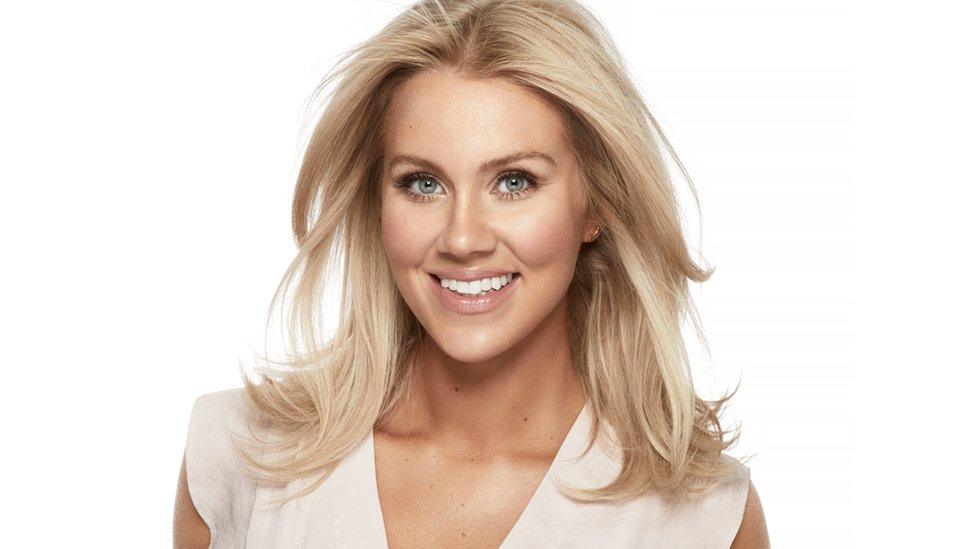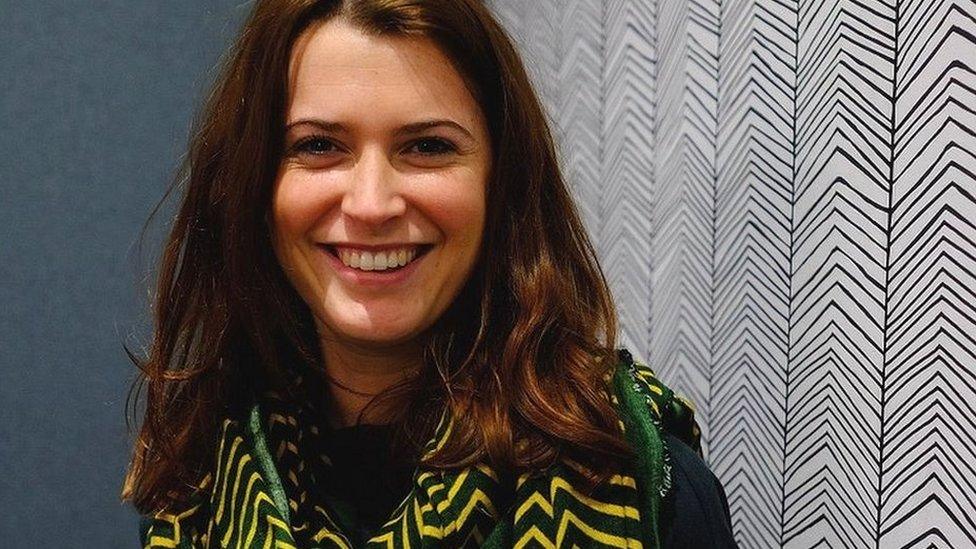'How a 3am epiphany changed my life'
- Published

After a sleepless night worrying about her future, Kristina Karlsson got out of bed at 3am and put her dreams on paper
A eureka moment led Kristina Karlsson to launch a stationery business in the 1990s. It's since gone global and has sales of 80m Australian dollars ($60m; £46m).
Ms Karlsson has always described herself as a "stationery freak", the kind of person who delights in brand new notebooks and freshly sharpened pencils.
It's fitting then that she launched her career with a simple to-do list.
Nearly 20 years ago, after a sleepless night worrying about her future, Ms Karlsson got out of bed at 3am and put her dreams on paper.
Then 24, the Swedish-born world traveller had moved to Melbourne, Australia, to be with her partner, Paul Lacy, and she was desperate to find her purpose in life.
"It was difficult to settle in a new country," she says. "I was really lost."

Kikki.K's stationery has a Swedish design aesthetic
With Mr Lacy's encouragement, Ms Karlsson wrote what she now calls her "3am list", a set of goals and values for the future. She wrote that she wanted to love her job, own her own business, and stay connected to her native Sweden.
She had relatively humble financial aspirations too.
"I wanted to make $500 a week," she says with a laugh.
Ms Karlsson went on to found kikki.K, a global stationery and homeware retailer. There are now more than 100 kikki.K boutiques across Australia, as well as stores in New Zealand, Singapore, Hong Kong, and most recently, the UK.
Kikki.K has become a household name in Australia, where it's known for its Swedish design aesthetic and the motivational messaging on its products.
You can even buy a "3am journal", inspired by Ms Karlsson's late-night epiphany.

Kikki.K now has more than 100 boutiques around the world
"We sell products inspired by dreaming - how to dream and how to create your dream life," she says.
Ms Karlsson grew up in the small Swedish city of Falkenberg, where she dreamed of one day travelling the world.
She spent her late teens and early 20s doing odd jobs in the US and Europe, including a stint as a nanny in Beverly Hills, until she met Mr Lacy at a ski resort in Austria. Then, after moving to Melbourne and writing her 3am list, Ms Karlsson decided to set up a home office.
But she found that she longed for the "simple, beautiful and functional" stationery products available in Sweden - from pencil sharpeners to storage boxes, notepads to pencil cases.
In Australia, she says, it was hard to find anything outside major department stores or office supply companies.
"As a Swedish person, I grew up with really beautiful stationery and notepads around me. But I found that everything [in Australia] was price-driven, badly designed and boring."

Kikki.K also sells homeware and gifts
Sensing a gap in the market, Ms Karlsson launched kikki.K, a play on her childhood nickname. She started designing her own Swedish-style notepads and greeting cards and selling them to friends.
By 2001 she had launched her first boutique in a central Melbourne shopping mall - although this came with risks as Mr Lacy had to sell his house to fund the store.
"I was a believer, that's for sure," says Mr Lacy who is now a partner in the firm. "As a little business with a very big ambition and growing fast, you're often investing money ahead of the growth and you're doing it on faith."

More The Boss features, which every week profile a different business leader from around the world:

The gamble paid off as the business begin to grow fast, adding homeware and gifts to its range, and trying out new marketing strategies to engage its loyal customers.
One has been to run motivational workshops in Kikki.K stores on subjects like goal-setting, planning and mindfulness, which have become "very popular", Ms Karlsson says.
Despite her flair for commerce, she had no university degree or business experience when she founded kikki.K and was struggling to learn English.
Ms Karlsson even recalls thinking that an invoice had "something to do with voices or speaking".

Kikki.K runs workshops in its stores on topics such as mindfulness
Setbacks were a regular occurrence. On one occasion five years ago, a simple spreadsheet error turned into an order for a million dollars' worth of surplus stock.
"We're very human and when something like that hits you it takes your breath away," Mr Lacy says.
"It forced us in the January after Christmas that year to trade the stock a bit harder. We actually learnt so much from it that we ended up in future years buying more stock before Christmas, knowing that we could trade really well in January."
To help run kikki.K, Ms Karlsson has in recent years appointed chief executives, while she maintains the title of creative director. She and Mr Lacy remain the biggest shareholders, but the company has also brought in other investors.
Ms Karlsson says she planned "from day one" to expand the business to overseas markets.
In 2015, kikki.K opened boutiques in the UK, its first stores outside Asia-Pacific. The company has also been selling products at Nordstrom department stores in the US and online to customers in 143 countries.

Ms Karlsson always planned to expand the business
"They are really leveraging that Scandinavian design," says Associate Professor Gary Mortimer, of the Queensland University of Technology's business school. "It's been very popular across Western culture, as we've seen with the success of Ikea."
Niche and trendy stationery products have also flourished in the social media era, with stationery bloggers and Instagrammers gushing over greeting card designs, desk planners and calligraphy.
Mr Lacy says many international kikki.K customers discovered the brand on the internet.
"There was this phenomena of people filming themselves and posting YouTube videos of themselves un-boxing their beautiful kikki.K products... it was just this viral thing."
But international expansion comes at a cost, and the company suffered an 8.4m Australian dollar loss in 2017 as it invested in its global growth. The firm says it is looking at securing additional investment.
"I think any international expansion is a long game," says Dr Mortimer. "You're not going to go into a country and immediately produce results."
He says kikki.K does have one thing in its favour - an origin story that matches the brand.
"The owner is Swedish and the design is Scandinavian, so there's a lot of authenticity between the ownership and the brand," he says. "There is a growing segment of shoppers that really want to know the story behind the brand. I think that's what drives successful entrepreneurs today."
- Published6 November 2017

- Published11 April 2017
